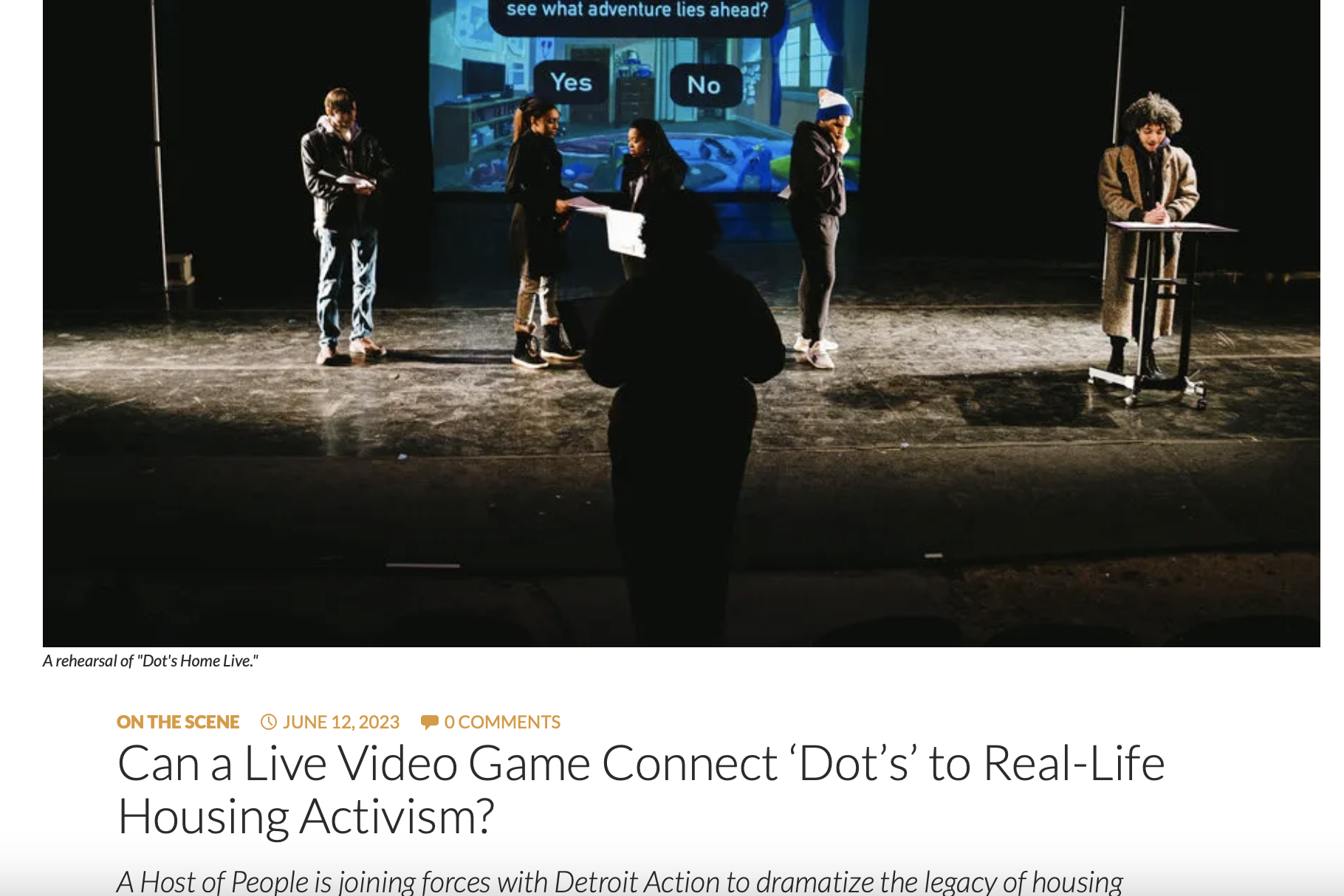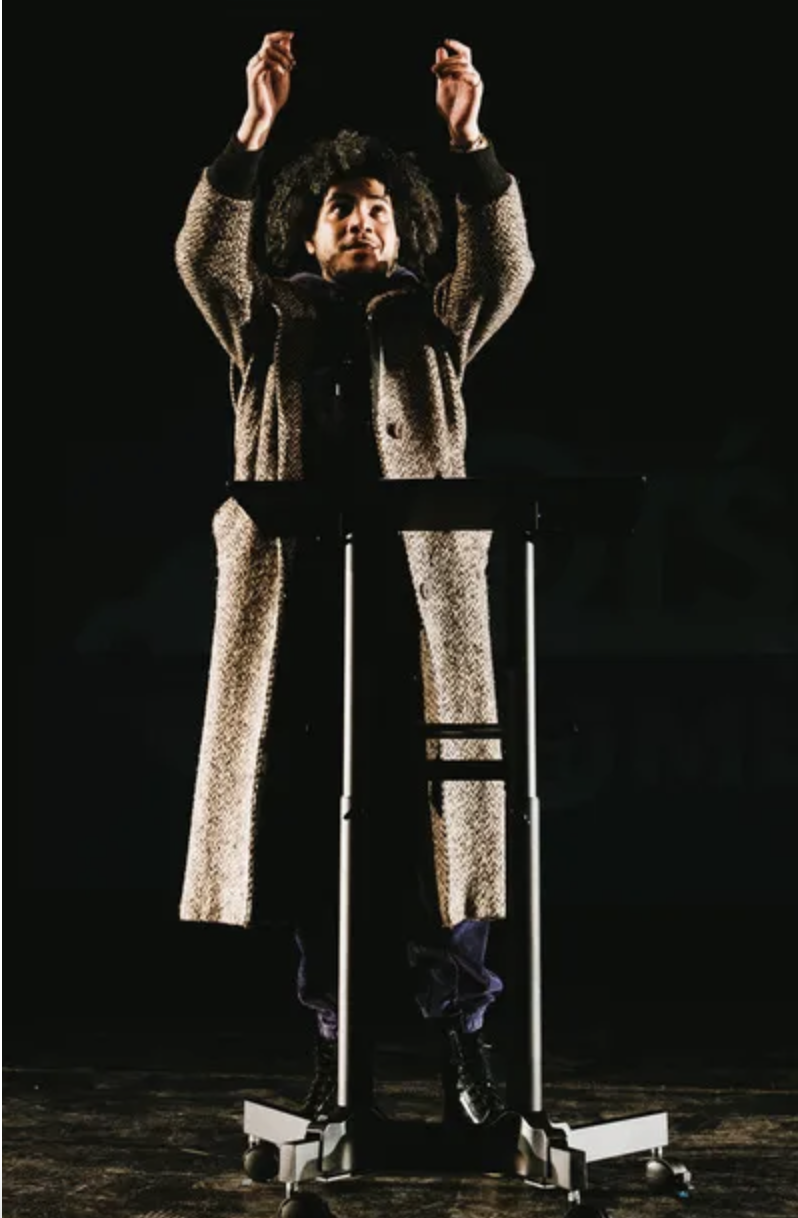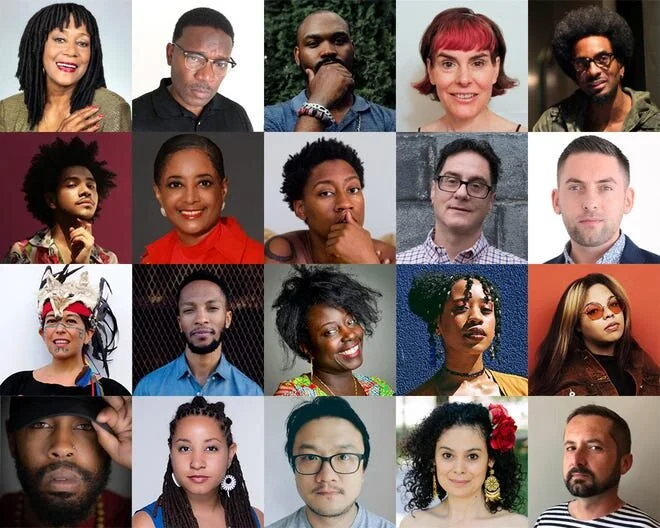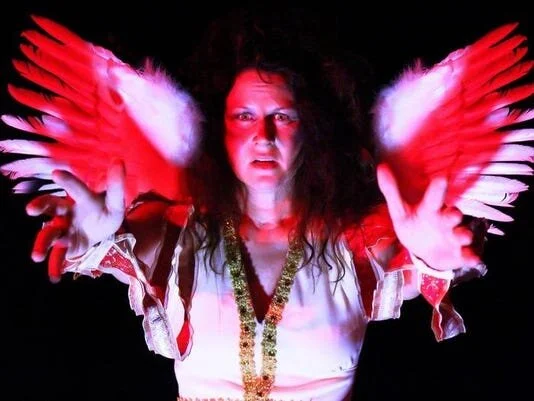press
American Theatre Magazine
Can a Live Video Game Connect ‘Dot’s’ to Real-Life Housing Activism?
A Host of People is joining forces with Detroit Action to dramatize the legacy of housing discrimination in a participatory, collective setting.
BY BRIDGETTE M. REDMAN - July 12, 2023
The story of housing in Detroit, especially for Black and brown people, is a complex tale, woven over generations from the strands of redlining, restrictive covenants, predatory lending, gentrification, housing projects, and unethical real estate practices in the post-foreclosure crisis. Now housing activists, community organizers, and artists are combining media to unravel this complicated tapestry and capture the attention of a new generation.
On June 30 at 7 p.m. and July 1 at 2 p.m., the Detroit-based ensemble theatre A Host of People will present Dot’s Home Live, a devised theatrical event adapted from the video game “Dot’s Home,” touching on themes of racial justice, housing policy, and time travel. It’s a collaboration between A Host of People and Detroit Action, an affiliate of PowerSwitch Action, a national network of housing organizations. The show will take place at Andy Arts, a community arts center on 3000 Fenkell Street in Northwest Detroit.
Christina Rosales, a housing and land justice director for PowerSwitch Action, originally co-created “Dot’s Home” in 2021 as a way to help build solidarity and community. The game starts in present-day Detroit, with a young Black woman named Dot living with her grandmother, Mavis, in their family home. They immediately confront a predatory speculator who is buying up homes in the neighborhood to flip them for a profit. As her grandmother mulls selling the home, Dot steps through a door that takes her on a journey through time to witness her family’s history with the house, from the time her grandparents first arrived from the South to her parents deciding whether to stay or leave Detroit, to her sister becoming a real estate agent and making decisions about the neighborhood. At every historical point, the player makes decisions for Dot’s family that have repercussions in the present day. The stories of the game were based on real incidents in the lives of the developers on the team, many of whom had connections to Detroit.
“I came into this work as a housing organizer,” said Rosales, “and the whole thing behind creating the game is to reach an audience we don’t normally reach and then to have them grapple with these big questions about what it means to have these huge disparities and wealth and home and opportunity.”
While the game won awards and educated its players about how exclusionary housing polices have historically kept people of color from achieving home ownership and building family wealth, Rosales acknowledged that video games have limited utility as an organizing tool, since people typically grapple with them individually rather than in a community setting.
“That’s hard when you’re trying to build solidarity as a collective toward this vision you have,” Rosales said, adding that she and their team toyed with how to bring the game to a group setting and use it more effectively in organizing. “What seemed to make the most sense was theatre—you go into a theatre as individuals, but you experience something as a collective.”
Their team approached A Host of People in December 2022 about turning the video game into a theatre piece. Paige Wood, the game’s supervising director and a Detroit artist, was familiar with the theatre ensemble and their work, and connected the two organizations. Sherrine Azab, co-director of A Host of People, got excited about the project as soon as she played the game. She said the project has moved quickly since then, as the troupe has written the script, tried it out in front of a test audience, and revised it further.
“What’s really great about the video game is that the story really lends itself to coming to life,” Azab said. “The characters are really fleshed out. They have a lot of backstory already. The world builders have a lot of information that has been given to us about who these people are.”
A team of people, including Rosales, Wood, and her co-director Toni Cunningham, have collaborated on adapting the game into a theatrical script. The process has involved many partnerships with community organizations, who have provided feedback about how the show will be presented and how it can be used to take action while still being a high-quality arts experience. It provides a model, Azab said, for how grassroots organizations can use arts and culture to spread their message and further their work.
One major change from the video game: the creation of a host character named 4D, who guides the audience through the choices that change the direction the script takes. Chris Jakob plays 4D, and will act as an intermediary between the audience and the actors. As Dot takes her journey, there are moments that 4D will pop in to provide historical context and ask the audiences what decisions he wants to have her make.
Chris Jakob as 4D.
“4D is definitely the video game element,” Jakob said. “Everything else is essentially a play in so many ways, but he adds the twist. He’s called 4D because he really does break through another dimension. We’ll have so many elements from the video game and so many visual cues for decisions that are very much like the game.”
“4D is definitely the video game element,” Jakob said. “Everything else is essentially a play in so many ways, but he adds the twist. He’s called 4D because he really does break through another dimension. We’ll have so many elements from the video game and so many visual cues for decisions that are very much like the game.”
At the show’s end, the audience will witness how their choices have affected the future of Dot’s family, with the cast prepared to present different endings based on those choices. In April, A Host of People did a 25-minute test production of the prologue and first “chapter” of the game to test their proof of concept. It was also a chance to test some of their projection designs, and whether they supported the audience choices. The test audience comprised members of Detroit Action.
“Their buy-in to the project was instantaneous,” Azab recalled. “Everything in regards to the audience interaction completely worked, and we had an amazing discussion afterward about how much more interaction they actually wanted.” The choices presented in the game “are quite hard,” she added, inviting deep emotional engagement with the character, but game format also means “you’re having an amazing collective experience with the people around you that feels very lively and participatory.”
Rosales had felt it was important to have community partners contribute to the early stage of the development to make sure Dot’s Home Live will be an effective organizing tool. But she found that the feedback focused a lot on improving the game aspect.
“They had a lot to say,” Rosales said of the Detroit Action test audience. “They were overwhelmingly positive about the experience, and then they said, ‘We need more participation.’”
They also helped identify areas of the script that needed more clarity, such as concepts related to redlining and contract for deed, a predatory practice that has often been used to drain home equity from communities of color.
Ultimately, Rosales said she wants Dot’s Home Live to speak to artists and audiences about their critical roles in making a better society.
“I want artists to know that their voice and vision is so important to movement work,” Rosales said. The physical reality theatre, she added, gives audiences “more of a chance of envisioning and practicing a multiracial, feminist democracy. The sign of a healthy democracy and civic life is that there’s impactful theatre pieces in the world and that they are accessible to all kinds of people, including the folks we’re including in this whole collaboration.”
Azab concurred: The theatrical form, she said, can energize people in a visceral manner, drawing everyone on a journey together to witness how housing policies have affected real families in real time. She marveled at “the collective experience of being able to have these conversations with others and to be able to share not just stories that people are experiencing, but to be able to generate coalition building.”
Bridgette M. Redman (she/her) writes about theatre and the arts for publications around the country. Her work has recently appeared in Encore Monthly, OnStage blog, and the Chicago Reader. She’s been a theatre critic since 2005.
Creativity, diligence pay off for artists awarded $25K grants from Kresge Arts in Detroit
Julie Hinds - Detroit Free Press - July 2, 2020
…….On Thursday, Kresge Arts in Detroit announced the 30 metro Detroit artists who will receive Kresge Artist Fellowships and Gilda Emerging Artist Awards.
[Jakob] is among the 20 artists named Kresge Artist Fellows, which comes with a $25,000 "no strings attached" grant. That's up from 18 fellows in 2019. Ten emerging artists were given Gilda Awards — eight more than last year — which come with $5, 000 grants. The award is named for the late educator and mentor Gilda Snowden, a 2009 Kresge Artist Fellow.
The total of $550,000 in grants represents an increase of $90,000 from 2019, a sign of Kresge Arts in Detroit's commitment to a local creative community that continues to endure the shutdown of theaters and other venues where they usually earn a living — and where they provide inspiration, comfort and food for thought to audiences.
"It is in times like these – full of uncertainty, pain, and injustice – that the arts play a unique role in provoking society to deeper reflection and arcing us to higher aspiration," said Kresge Foundation and CEO President Rip Rapson in a statement.
"A long, enduring investment in the arts, and in individual artists, is an insurance policy – that we never lose sight of our common humanity, never overlook the travails of our history, and never give up hope for the boundless possibilities for our future. There could be no clearer proof than the group of artists presented today.”
….Kresge Artist Fellowships and Gilda Awards are funded by the Kresge Foundation and administered by the College for Creative Studies. Given out annually, they run on a two-year cycle of categories. The 2020 awards focus on two categories: live arts and film & music. In 2021, the categories will be literary arts and visual arts.
Those who apply are scrutinized by local and national panelists and selected through criteria that include having a track record of high-quality work and the potential to impact communities in metro Detroit…..Along with the $25,000 grants, Kresge Artist Fellows get one year of help with professional development in areas like networking and promotion. For 2020, the support will be led by Kresge Arts in Detroit for the first time, instead of by an outside group.
….
2020 Kresge Artist Fellows
Live Arts Fellows
Ajara Alghali, dance
Kia ix Arriaga, interdisciplinary work
Shawntai Brown, playwriting
Karilú Alarcón Forshee, interdisciplinary work
Debra J. White-Hunt, dance and choreography
Chris Jakob, interdisciplinary work
Melanie Manos, performance art
Michael Manson, dance and choreography
Andrew Morton, playwriting and theatre directing
Salakastar, interdisciplinary work
Film & Music Fellows
Vincent Chandler, music composition and performance
Marcus Elliot, music composition and performance
Amp Fiddler, music composition
bree gant, interdisciplinary work
Mike Khoury, music composition and performance
Rafael Leafar, music composition and performance
Joo Won Park, music composition and performance
Naima Shamborguer, music composition and performance
Brandon Walley, film directing
Paige Wood, screenwriting and film directing
Gilda Awards in Live Arts
Celia Benvenutti, dance and choreography
Aj Sims, dance and choreography
Thank You So Much For Coming (Maddy Rager, Scott Crandall), interdisciplinary work
Lis Chere Thomas, performance art
Gilda Awards in Film & Music
Ian Fink, music composition and performance
Karl Kingson, screenwriting and film directing
Emily Rogers, music composition and performance
Summer Like The Season (Summer Krinsky), music composition and performance
TeddyBoy, interdisciplinary work
We Are Culture Creators (Michael Reyes, Elizabeth Stone, Xavier Cuevas), interdisciplinary work
full article here.
link to artist portfolio here.
A Host of People awarded as 2018 Kresge Artist Fellows!
Featured in Southwest Airlines Magazine.
Photo by Chris Crisman
At midsummer, a sweet ‘Dream’
What do you call 800 people enjoying a Shakespeare play outdoors on a warm July evening in midtown Detroit?
How about a midsummer night’s dream? Which not coincidentally is the latest offering from Shakespeare in Detroit, intrepid producer Samantha White’s theater company, which brings free Shakespeare performances to various locations in the city. “A Midsummer Night’s Dream,” the troupe’s first foray into comedy, was staged Saturday at New Center Park. And yes, the place was filled with some 800 people.
They were treated to a delightful production….
……Chris Jakob, as mischief-making Puck, is indefatigable as he leaps and dashes about.
………it’s certainly a pleasure to have Shakespeare in Detroit.
— Martin F. Kohn
review for A Midsummer Night’s Dream with Shakespeare in Detroit.
full review here: https://www.encoremichigan.com/2014/07/at-midsummer-a-sweet-dream/
Theater Review: Angels in America, Parts 1 and 2
Let's just get this out of the way. In what follows, I'm going to try to convince you to go see the Ringwald Theatre's production of parts one and two of Angels in America. The production is masterful, humane, and most of all, important. In a rare occasion, you have the opportunity to see both parts simultaneously, a full seven-and-a-half hours of theater. If you care at all about great writing, excellent theater, or American culture whatsoever, I suggest you do so.
…. The young and talented cast of the Ringwald delivers over and over again….
It's almost impossible to choose standouts in the ensemble cast, as they are all quite brilliant, but when forced, Chris Jakob seems to have been born to play Belize
, and Bailey Boudreau handles the difficult queen/patient/prophet transformation with particular grace. Really though, the entire cast is spectacular, and all of the principals have excellent chemistry. It's apparent within the first half hour that this play means something personal to the actors, and they have each risen to the challenge of the effecting text and glacial run time. By my count, each one of the principal actors cried actual tears at least once onstage.
……Not many people write like this any longer, and few companies are able to stage something with this verve and nobility. Kushner and the Ringwald have committed the great American novel to stage, a symphony of ideas, pathos, and emotion. They offer the rare opportunity to see both parts of this essential play at once. I unequivocally and without reservation recommend you do.
- Drew Philip, The Metro Times.
full review here: https://www.metrotimes.com/detroit/theater-review-angels-in-america-parts-1-and-2/Content?oid=2247656
PHOTO BY RICK LIEDER
Dracula leaves audience hungry for more
Nerve’s Dracula is not your typical staid dinner theatre production. That’s for sure.
With the subtitle of “Appetite Must Be Fed,” the unusual, immersive production definitely leaves the audience with questions and definitely wanting more.
Theater goers who prefer to sit down in a comfy chair to gape should stay home. From the moment you step into the lobby of the theater, which is actually not a theater at all, there is the promise of something much more.
Dracula takes place in the Izzy, a former mercantile building in Detroit’s historic Corktown neighborhood. There is no stage, and no fourth wall: the patrons are invited to sit at the table, while three vampires—terrifying Renfield, seductive Lucy, and Dracula himself—confront Jonathan Harker, played by Chris Jakob. At each performance, Jakob will decide whether Harker flees to safety, or stays to be consumed—and only he will know which way the action turns each night.
….Jakob is mesmerizing as Jonathan Harker, the hapless dinner guest who alternatives between fear and fascination with his hosts.
……Clapping seems rude, as it would break the spell of the evening, but the participants do it anyway, to acknowledge the extraordinary experience they have been gifted with.
— Tanya Gazdik
full review here: https://www.encoremichigan.com/2016/01/dracula-leaves-audience-hungry-for-more/
PHOTO BY BRANDY JOE PLAMBECK





